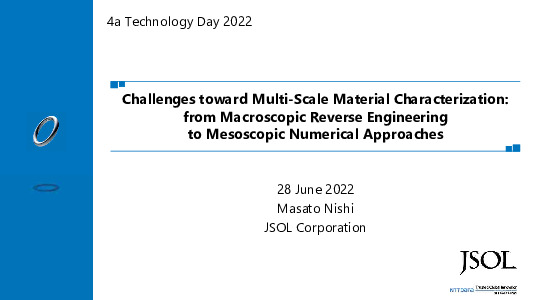In recent years, advanced material models that are able to define fracture criteria that depend on the stress state have been implemented into commercial FEM software. On the other hand, as material models become more sophisticated, the challenge is how to identify these material parameters accurately and efficiently. A practical solution to this problem is a macroscopic reverse engineering approach that enables the identification of material parameters that cannot be directly measured in an experiment by performing FE simulations for a series of material experiments. Some case studies of identifying fracture parameters of a high strength steel and aluminum by reverse engineering is shown in this presentation. Then, two mesoscopic approaches, material parameter identification for metal by crystal plasticity FEM and the prediction of short-fiber reinforced plastic by using a mechanistic machine learning, which can be approaches to reduce the number of material experiments and numerically establish advanced material models.

